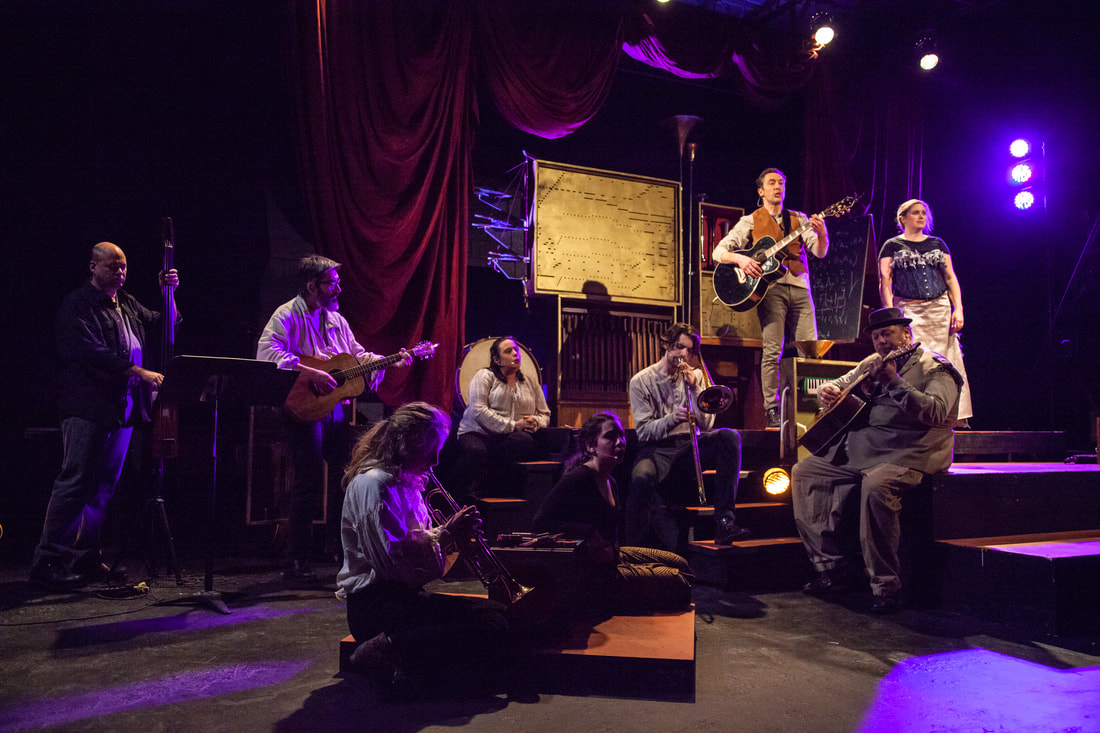 When you enter to take your seat for Wilbury Theatre Group’s production of Futurity, you could be forgiven for thinking you’ve passed through the curtains into a slightly shifted dimension. Instead of a play, a chalkboard on stage advertises live music – “tonight at 7:30!” – played by “The Algorhythms.” Brien Lang, Futurity’s director, explained that creator César Alvarez wanted to shake up the convention of the theatrical musical and perform instead for the engaged, fourth-wall-piercing audience of a concert. After a bit of pre-song banter, the multitalented cast (everyone plays, many on several different instruments) gets going with the story of fictional Union soldier Julian Munro and the early 19th-century historical figure Ada Lovelace, considered the first computer programmer.
When you enter to take your seat for Wilbury Theatre Group’s production of Futurity, you could be forgiven for thinking you’ve passed through the curtains into a slightly shifted dimension. Instead of a play, a chalkboard on stage advertises live music – “tonight at 7:30!” – played by “The Algorhythms.” Brien Lang, Futurity’s director, explained that creator César Alvarez wanted to shake up the convention of the theatrical musical and perform instead for the engaged, fourth-wall-piercing audience of a concert. After a bit of pre-song banter, the multitalented cast (everyone plays, many on several different instruments) gets going with the story of fictional Union soldier Julian Munro and the early 19th-century historical figure Ada Lovelace, considered the first computer programmer.
Munro (Alexander Platt) and Lovelace (Meg Sullivan) correspond about the possibilities offered by machines to humans. Eventually, they optimistically decide to build what they call a Steam Brain — a computer with imagination and creativity like a human brain, that, free of human prejudices and human limitations, can imagine paths to peace. Platt’s Munro, who sings of his dreams of forging a peaceful future through science in the fast-paced “Don’t Wait,” is a man whose intellect and passionate energy cannot be constrained by his role as Army draftee. But his days are marked by the rhythms of war, as his regiment marches to Virginia to dismantle a railroad supplying the Confederate troops, and then off to fight the enemy. His is a world where peace isn’t as simple as everyone laying their arms down when the conflict is over even if the United States decides whether or not it can treat black people as property. How can we even have the conversation about whether machines can have humanity when we don’t acknowledge the humanity of other humans? Even knowing, going in, that Futurity was a Civil War-era play about building a computer, I didn’t see this twist on the theme coming, and it’s very effective. Jason Quinn is a stand-out in the cast as The General, giving a powerful speech recognizing that his fight to be seen as human will last long after the war is over, and taking the lead solo in the subsequent song (“I am still in the valley of the shadow of death…”).
Wilbury’s production of Futurity is the first one that isn’t done by the creators themselves, Alvarez and The Lisps, and Lang says that it was initially intimidating, but then liberating, to make new choices about how to present the work. He chooses to lean even further into the theme of music. It’s not just that the story is presented in the form of a concert (with lighting by Kelly Lipsey that does double duty as an LED-centric concert lightshow and an atmospheric theater design), or even that when ordered to “present arms” before battle, the soldiers raise their instruments. The marvelous Steam Brain itself, conceived by set designer Keri King and finally revealed late in the show after great anticipation, is partly composed of chimes, bells, melodicas and other musical instruments. “Music and letters,” says Lang, “were the way people communicated in this period.” That sentiment is borne out in the way Munro’s comrades in arms pass folk-like tunes such as “Banks of the Arkansas” or “Cumberland Gap” back and forth as they march or make camp, sing work songs like “Sinner’s Land” while dismantling the railroad tracks/building the computer, or join with Quinn in the psalm. The soldiers-ensemble aspect, heightened through the musical re-arrangement work of music director Milly Massey along with Lang, was one of my favorite parts of the show (it seems almost counterintuitive to pick out specific people, but Dave Carney on bass and Christine Treglia on percussion set the rhythm of the march or the machines and kept it all going, and Ava Mascena’s violin lent Ken Burns-esque flavor to slower numbers).
Is the future laid out like a railroad track, or are its potential paths as many as the pathways in the brain? Well, the play contains, as it must, an element of disappointment on that front: We all know that no computer was developed in the 19th century to successfully end all war, try as Munro might to throw his body into operating the machine when he sees his comrades fall in battle. Nor did the Internet, alluded to in the show, finally become the technological advance that would hit on the way to break through bias and find the humanity in humans. But the Lisps’ message is ultimately optimistic. Each soldier might be, as Futurity presents it, “a cog in a machine” – but what that means is not that each person is an emotionless metal part, but rather that the whole machine is, at least in Wilbury’s production, more like a chorus of humanity. That chorus, with all voices working together as scientists or artists or just as people who can imagine problems being solved beyond our own lifetimes if not within them, can change the future.
The Wilbury Theatre Group – 40 Sonoma Court, PVD – presents Futurity through Dec 30. For tickets and more information, visit thewilburygroup.org or call the box office at 401-400-7100.